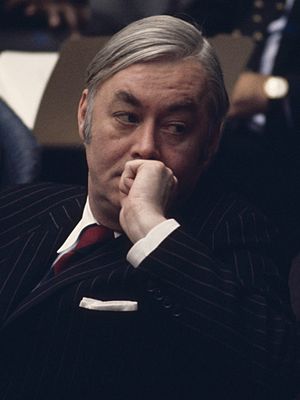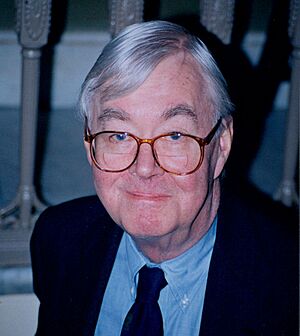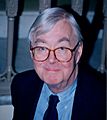Daniel Patrick Moynihan facts for kids
Quick facts for kids
Daniel Patrick Moynihan
|
|
|---|---|

Moynihan in 1976
|
|
| United States Senator from New York |
|
| In office January 3, 1977 – January 3, 2001 |
|
| Preceded by | James Buckley |
| Succeeded by | Hillary Clinton |
| Chair of the Senate Finance Committee | |
| In office January 3, 1993 – January 3, 1995 |
|
| Preceded by | Lloyd Bentsen |
| Succeeded by | Bob Packwood |
| Chair of the Senate Environment Committee | |
| In office September 8, 1992 – January 3, 1993 |
|
| Preceded by | Quentin Burdick |
| Succeeded by | Max Baucus |
| 12th United States Ambassador to the United Nations | |
| In office June 30, 1975 – February 2, 1976 |
|
| President | Gerald Ford |
| Preceded by | John Scali |
| Succeeded by | Bill Scranton |
| 10th United States Ambassador to India | |
| In office February 28, 1973 – January 7, 1975 |
|
| President | Richard Nixon Gerald Ford |
| Preceded by | Kenneth Keating |
| Succeeded by | Bill Saxbe |
| Counselor to the President | |
| In office November 5, 1969 – December 31, 1970 |
|
| President | Richard Nixon |
| Preceded by | Arthur Burns |
| Succeeded by | Donald Rumsfeld |
| White House Urban Affairs Advisor | |
| In office January 23, 1969 – November 4, 1969 |
|
| President | Richard Nixon |
| Preceded by | Joe Califano (Domestic Affairs) |
| Succeeded by | John Ehrlichman (Domestic Affairs) |
| United States Assistant Secretary of Labor | |
| In office January 22, 1961 – November 2, 1963 |
|
| President | John F. Kennedy |
| Personal details | |
| Born | March 16, 1927 Tulsa, Oklahoma, U.S. |
| Died | March 26, 2003 (aged 76) Washington, D.C., U.S. |
| Political party | Democratic |
| Spouse |
Elizabeth Brennan
(m. 1955) |
| Children | 3 |
| Education | City College of New York Tufts University (BS, BA, MA, PhD) London School of Economics |
| Military service | |
| Allegiance | United States |
| Branch/service | United States Navy |
| Years of service | 1944–1947 |
| Rank | Lieutenant (junior grade) |
| Unit | USS Quirinus (ARL-39) |
Daniel Patrick Moynihan (born March 16, 1927 – died March 26, 2003) was an important American politician, diplomat, and sociologist. He was a member of the Democratic Party. He represented New York in the United States Senate from 1977 to 2001. He also worked as an advisor to President Richard Nixon.
Moynihan was born in Tulsa, Oklahoma. His family moved to New York City when he was young. After serving in the United States Navy, he earned a PhD in history from Tufts University. He worked for New York Governor W. Averell Harriman. Later, he joined President John F. Kennedy's team in 1961.
Contents
- Daniel Patrick Moynihan: A Life in Public Service
- Honors
- Quotes
- Images for kids
- See also
Daniel Patrick Moynihan: A Life in Public Service
Daniel Patrick Moynihan had a long and interesting career. He worked for several presidents and served as a senator for many years. He was known for his smart ideas and for often thinking differently from others.
Early Life and Education
Moynihan was born in Tulsa, Oklahoma. His mother was a homemaker, and his father was a newspaper reporter. When he was six, his family moved to New York City. He grew up in a working-class area called Hell's Kitchen.
He worked shining shoes and went to different schools. He graduated from Benjamin Franklin High School. He also spent summers on his grandfather's farm in Bluffton, Indiana. Before college, he briefly worked as a longshoreman, helping load and unload ships.
College and Military Service
Moynihan attended the City College of New York (CCNY). At that time, college was free for city residents. In 1944, he joined the United States Navy during World War II. He studied at Middlebury College and Tufts University.
He finished his active service in 1947 as a lieutenant (junior grade). He then returned to Tufts and earned two degrees. He also got a master's degree from the Fletcher School of Law and Diplomacy. He continued his studies in London as a Fulbright fellow. He earned his PhD in history in 1961 from Tufts.
Political Career and Return to Academia
Moynihan's political journey began in the 1950s. He worked for New York Governor Averell Harriman. He was a speechwriter and acting secretary. During this time, he met his future wife, Elizabeth Brennan.
After Harriman lost the 1958 election, Moynihan went back to teaching. He taught at several universities, including Syracuse University. In 1960, he was a delegate for John F. Kennedy at the Democratic National Convention.
Working for Presidents Kennedy and Johnson
In 1961, Moynihan joined President Kennedy's administration. He worked as an assistant to the United States Secretary of Labor. In 1962, he wrote a rule called "Guiding Principles for Federal Architecture." This rule encouraged new and creative designs for government buildings.
From 1963 to 1965, he was an Assistant Secretary of Labor. He focused on creating national policies for what became the War on Poverty. He believed the government should do more than just ensure equal rights. He thought it should actively help overcome past discrimination.
Moynihan noticed that even with less unemployment, more families were receiving welfare. These were often single-parent families. He published a report in 1965 called The Moynihan Report. This report was controversial.
Local Politics and Harvard
Moynihan left the Johnson administration in 1965. He ran for president of the New York City Council but lost. He then became a professor at Harvard University in 1966. He taught education and urban politics.
During this time, he saw a lot of unrest and riots in the United States. He believed that liberals and conservatives needed to work together. He thought the next president should unite the nation.
Serving President Nixon
In 1969, Moynihan joined President Richard Nixon's team. He became Assistant to the President for Domestic Policy. He was very influential because he had studied social policies. He suggested a "negative income tax" plan to help families, but it did not pass.
He was promoted to Counselor to the President later that year. He left the administration at the end of 1970. He believed that the issue of race had been talked about too much. He suggested a period of "benign neglect" where racial rhetoric would fade. He later said his critics misunderstood this idea.
US Ambassador
Moynihan served as an ambassador for the United States. This meant he represented the country in other nations and at the United Nations.
Ambassador to India
In 1973, Moynihan became the United States Ambassador to India. The relationship between the two countries was difficult at the time. Moynihan worked to improve things. He helped arrange a deal where a large debt India owed the U.S. was settled.
Part of the money was used to fund cultural and educational programs. On February 18, 1974, he gave the Indian government a check for a huge amount of money. It was the largest check ever written in banking history at that time.
Ambassador to the United Nations
In 1975, Moynihan became the United States Ambassador to the United Nations. He served under President Gerald Ford. He took a strong stance against Communism. He also strongly supported Israel.
He spoke out against a UN resolution that said Zionism (the movement for Jewish self-determination) was a form of racism. He believed this resolution was completely wrong. His strong speech made him well-known and helped him win a Senate seat later.
Moynihan also played a role during the Indonesian invasion of East Timor in 1975. He helped ensure the UN Security Council did not take action against Indonesia. He later said he had defended a "shameless" policy during the Cold War.
His time at the UN changed his views. He began to see the Soviet Union as a weak state in decline, not just an expanding power. He thought it was headed for collapse. This idea influenced his thinking later on.
United States Senator from New York (1977 - 2001)
In 1976, Moynihan was elected to the U.S. Senate for New York. He defeated the current senator, James L. Buckley. He served in the Senate for 24 years.
Representing New York's Interests
As a senator, Moynihan strongly supported New York. He created a yearly report called the Fisc. This report showed that New York paid more in federal taxes than it received back in government spending. He used this report to argue for more federal money for his state.
He was also interested in foreign policy. He served on the United States Senate Select Committee on Intelligence. He became a critic of President Ronald Reagan's foreign policy. Moynihan argued that the Soviet Union was facing big internal problems. He predicted that ethnic conflicts would replace the spread of Communism.
In 1981, he helped create the Friends of Ireland. This group worked to promote peace in Northern Ireland.
Breaking with Party Lines
Moynihan often disagreed with his own Democratic Party on certain issues. As chairman of the Senate Finance Committee in the 1990s, he opposed President Bill Clinton's plan to expand health care. He famously said there was "no health care crisis in this country."
However, on other issues, he was more progressive. He voted against the death penalty and against a proposed amendment to ban flag desecration. He also voted against the Defense of Marriage Act and the North American Free Trade Agreement (NAFTA). He even voted against allowing the Gulf War. Despite his earlier work on welfare, he voted against welfare reform in 1996.
Public Speaker
Moynihan was a very popular public speaker. He had a unique style and was known for his smart and sometimes witty remarks. He spoke with a slight stutter, which made him draw out his vowels.
Commission on Government Secrecy
After the Cold War, Moynihan led a special group called the Commission on Government Secrecy. This group looked into how much information the U.S. government kept secret. It studied the "culture of secrecy" that had existed for 80 years.
The commission made recommendations to the President in 1997. Moynihan helped release secret files from the Federal Bureau of Investigation (FBI). These files showed Soviet spying in the United States. Much of this information had been secret for over 50 years.
After the information was released, Moynihan wrote a book called Secrecy: The American Experience. In it, he discussed how government secrecy affected American politics.
Personal Life
Moynihan married Elizabeth Brennan in 1955. They had three children: Tim, Maura, and John. They were married until Moynihan's death on March 26, 2003. He passed away from complications of a ruptured appendix, ten days after his 76th birthday.
In 1990, Moynihan was criticized for comments he made at Vassar College. During a question-and-answer session, he made a remark to a woman that caused a protest by students.
Career as Scholar
Moynihan was also a respected scholar and writer. He published many articles about urban politics and poverty. He wrote 19 books during his lifetime. One friend said he "wrote more books than most senators have read."
He coined the term "professionalization of reform." This means that government agencies sometimes create problems for the government to solve, instead of just reacting to problems.
In 1983, he received the Hubert H. Humphrey Award for his public service as a political scientist. After retiring from the Senate, he returned to teaching at Syracuse University.
Selected Books
- Beyond the Melting Pot (1963) – A study of American ethnic groups.
- The Negro Family: The Case For National Action (1965) – Also known as the Moynihan Report.
- Maximum Feasible Misunderstanding: Community Action in the War on Poverty (1969)
- A Dangerous Place (1978) – Co-authored with Suzanne Garment.
- Pandaemonium: Ethnicity in International Politics (1994) – About ethnic groups in global politics.
- Secrecy: The American Experience (1998) – About government secrecy.
Awards and Honors
Moynihan received many awards for his work:
- In 1966, he was elected to the American Academy of Arts and Sciences.
- In 1968, he was elected to the American Philosophical Society.
- He received the 5th Annual Heinz Award in Public Policy (1999).
- He received an Honorary Doctor of Laws degree from Tufts University.
- In 1989, he received the U.S. Senator John Heinz Award for Public Service.
- On August 9, 2000, President Clinton presented him with the Presidential Medal of Freedom. This is one of the highest civilian awards in the United States.
- In 1992, he received the Laetare Medal, a prestigious award for American Catholics.
- In 1994, he received the Lone Sailor Award for his naval and government service.
Honors
Several places and institutions have been named in his honor:
- The Moynihan Train Hall in New York City opened in 2021. It expanded New York Penn Station. Moynihan had supported this project for a long time. He even shined shoes in the original Penn Station as a boy.
- In 2005, Syracuse University renamed its Global Affairs Institute as the Moynihan Institute of Global Affairs.
- The federal district courthouse in Manhattan was named after him.
Quotes
Here are some famous quotes from Daniel Patrick Moynihan:
- "No one is innocent after the experience of governing. But not everyone is guilty." – From The Politics of a Guaranteed Income, 1973.
- "Secrecy is for losers. For people who do not know how important the information really is." – From Secrecy: The American Experience, 1998.
- "Everyone is entitled to his own opinion, but not his own facts." – A column from January 18, 1983, in The Washington Post.
- "The central conservative truth is that it is culture, not politics, that determines the success of a society. The central liberal truth is that politics can change a culture and save it from itself."
Images for kids
See also
 In Spanish: Daniel Patrick Moynihan para niños
In Spanish: Daniel Patrick Moynihan para niños
- List of U.S. political appointments that crossed party lines
- Benign neglect
- The Public Interest
 | Laphonza Butler |
 | Daisy Bates |
 | Elizabeth Piper Ensley |




